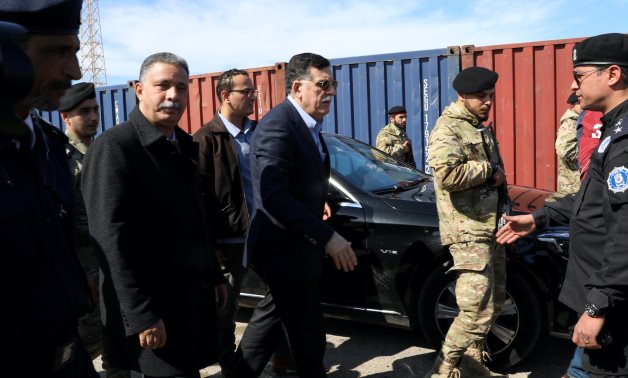
FILE PHOTO: Fayez Mustafa al-Sarraj, Libya's internationally recognized Prime Minister, visits Tripoli port after an attack, Libya February 19, 2020. REUTERS/Ismail Zitouny
CAIRO - 20 September 2020: The western region in Libya has been witnessing rapid events during the recent period at the political and military levels,the latest of which was the announcement of Prime Minister of the Government of National Accord, Fayez al-Sarraj, his intention to resign from his post and hand it over to the executive authority by the end of October 2020.
Sarraj expressed a desire to leave the political scene, givingthe allied forces in the western region a time limit before his withdrawal. Sarraj had previously retreated from submitting a final resignation as he was subjected to a great pressure.
Observers say that Sarraj, the president of the Libyan Presidency Council, does not makedecisions independently, but is rather pressured by the armed militias, the de facto ruler of the western region in Libya.These militias will not accept Sarraj's departure from the scene beforeagreeing on alternative figures for him, specifically from the city of Tripoli, and guaranteeing the continued allocation of funds to militants.
The position of the parties supporting Sarraj in Tripoli
The presence of the president of the Libyan Presidency Council in Tripoli is linked to several civil society organizations founded by Sarraj, most notably the Tripoli Commission, in addition to armed formations affiliated with several criminals and militants affiliated with the Libyan Brotherhood.
Those entities refuse the decision ofPresident of the Libyan Presidency Council, Fayez al-Sarraj, to leavethe scene before finding an alternative to playhis role in the Libyan capital and undermine the influenceof the armed formations affiliated with the city of Misrata inside Tripoli.
Militants from the city of Zintan and many supporters of the former Libyan regime involved in several institutions in the west of the country fear that Sarraj will leave without guarantees or an agreement about a Libyan figure who would continue to play his role in financing militias and distributing positions, which confirms the utter failure and the state of fragmentation that Sarraj caused during hispresidencyof the Libyan Presidential Council.
Misrata stream and the ambition of governance
Several armed formations within the city of Misrata, some from within the Libyan Government of National Accord, are struggling to take over the presidency of the Libyan Presidency Council, considering that Sarrajhas failed to manage the country's affairs or solve itscrises. This provoked the greed of several politicians in the city,most prominentlyMinister of Interior ofthe Government of National Accord, FathiBashagha.
The information received about Sarraj's intention to assign his deputy, Ahmed Maitiq, to head the Libyan Presidency Council sparked the anger and rejection ofthe Tripoli formations in fear thatMisratawould find a way to influence the Libyan capital;this is also rejected by entities from Zintan and Zawiya.
The power of the city of Misrata in the western region of Libya increased with FathiBashagha assuming the Ministry of Interior in the Government of National Accord, and with the appointment of Muhammad al-Haddad, who is also from Misrata, as chief of staff. This explains the nature of the conflict between Tripoli and Misrata.
The problem of dismantling armed militias and handing over their weapons is one of the most prominent challenges facing political partiesin Libya.
Sarraj and choosing a new prime minister
Among the proposed scenarios in Libya is to keep Fayez al-Sarraj as president of the Presidency Council, limit his powers, appoint a deputy from the western region and another from the eastern region, and assigna new prime minister separate from the Presidency Council to manage all political, military and economic files.
The most prominent figure to be nominated to head the new government in Libya is Minister of Interior, FathiBashagha, as he is the most powerful man in the western region, and he has clear and specific positions on limitingthe armed formations'authority.
Reactions of regional and international actors in the crisis
Several regional and international actors in the Libyan scene rejected the idea of Fayez al-Sarraj leaving thepolitical scene during this period, in conjunction with the moves of Washington and the United Nations Support Mission in Libya, acting by Stephanie Williams, for several considerations, most notably the lack of a clear vision of how to deal with the figures who will succeed Fayez al-Sarraj.
These parties realize that Sarraj’s exit from the scene will lead to a complete exacerbation of the situation in Libya and frustration of any efforts by the United Nations Mission, in light of the difficulty of convening the Libyan Political Dialogue Committee in Geneva shortly.
President Abdel Fatah al-Sisi had drawn a line in the sand - between Sirte on the Mediterranean and the area around the Jufra airbase in central Libya - as Egypt's "red line".Any attempt to cross that line by the militias loyal to Tripoli would be a direct threat to national security, according to Sisi.
A few days later, Egypt's parliament rubber-stamped a mandate for the president, who is also the supreme commander of the armed forces, to deploy troops as he saw fit.
On August 19, the UN Security Council extended the mandate of its integrated special political mission in Libya, listing a range of mediation tasks, while also charging the Secretary-General with conducting an independent review of its structure, priorities, and staffing effectiveness.
Adopting resolution 2542 (2020) by a vote of 13 in favor to 0 against with 2 abstentions (China, Russian Federation), the council decided to extend untilSeptember 15, 2021 the mandate of the United Nations Support Mission in Libya (UNSMIL) as an integrated special political mission.
Libya has been marred in violence between competing forces, militias, and extremists since the toppling and killing of Muammar Gaddafi in 2011. The conflict now pits the Tripoli-based Government of National Accord (GNA) against the Libyan National Army (LNA), led by Field Marshal KhalifaHaftar, for control of the country.

Comments
Leave a Comment